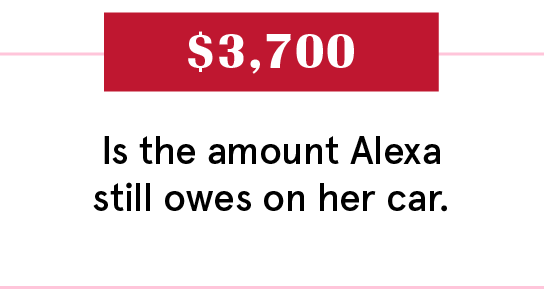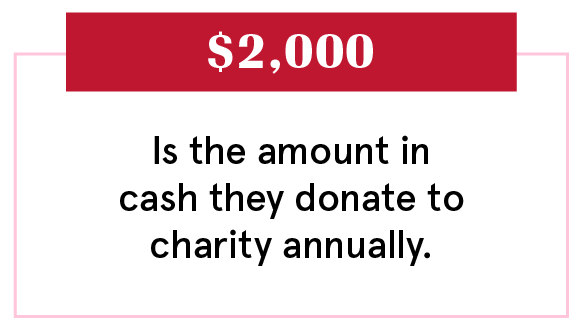The $283,000 Couple in Their 30s on the Fast Track to Early Retirement
The latest edition of Marie Claire's 'Couples + Money' series.
Welcome to Couples + Money, where we break through the confines of polite conversation. Forget questions about your sex life. We're getting even more personal. Let's talk about what you and your partner are doing—and not doing—with your paychecks.
Every other Thursday, an anonymous couple will get candid with MarieClaire.com about how they split their finances. We’ll break down what each person pays for individually, what they split, and all the gritty details—from who picks up the bill in restaurants to who picks fights over bank statements.
This week, we're talking with Alexa, 33, a freelance reporter, who earns about $108,000 per year ($9,000 per month), and her boyfriend, Jon, 31, a financial sales consultant, who earns $175,000 per year ($12,500 per month plus annual bonus). They've been together four years and live in Phoenix, Arizona.
Want to be profiled with your partner in Couples + Money? Get in touch: couples.money@hearst.com.
How It All Happened
Alexa: We met on OkCupid exactly four years ago. And it's been a little over two years that we've lived together.
Jon: The marriage conversation and all that is in the mix—thinking about it pretty seriously and pretty near term. I haven't put a ton of money thoughts into that, other than I imagine we'd just go full joint.
Our Dependents
Alexa: We have two cats. We just adopted our second a month ago!
Get exclusive access to fashion and beauty trends, hot-off-the-press celebrity news, and more.
Jon: She takes care of the pets. I'll help my dad, my brother, out from time to time, but nothing on an ongoing basis.
When We Told Each Other Our Salaries
Jon: We probably started more personal discussions before we moved in. In the last two years, we got a lot more in depth around spending, finances, how we feel about money, our families, and everything that goes with it. That's ongoing.
Alexa: We were on a road trip within two months of us dating, and he had this phone interview where he had to give his salary. So I knew right off the bat. He almost seemed embarrassed afterward. He asked, "Is that weird that I had that conversation in front of you?" But I didn't officially tell him my salary until we moved in together.
Why We Don't Have Joint Accounts
Jon: It's just naturally worked out. She buys toilet paper, and I buy paper towels. All the little things around the house, one of us just gets it whenever it's out. No one ever sat down and enumerated this. I don't know how exactly it happened.
Alexa: I was always adamant about splitting things equally. We split rent down the middle, and then we try to divide utilities. I take care of our internet bill, water, sewer, trash. He covers electricity. For groceries, it's not a clear line. We both have different diets; I eat mostly fish and he's a red meat eater, so we each do our own thing.
Jon: I'm getting swayed on joint accounts, a bit. I've always liked the concept of independent finances because it forces both people to be thinking about it. I'm meticulous about my expenses and tracking every single month. I think Alexa's a little more broad. I always thought bringing those together might make it much more difficult to track. But after a while, it gets silly: Like, "That's my mustard." There are a lot of benefits, but we've just never gone over that threshold yet.
How Often We Talk About Money
Alexa: We made the decision to buy a house at the beginning of this year. Since then, we're all in. We've been really forthright with all that.
Jon: I think it's opened up good conversations that are related to the core of who we are. It's been moving me a little bit away from this individualized mindset to—there's two of us, we're on a team. To me, money has always been: If you make it, spend it. It's yours. I've got to work my way out of that.
What We Keep Secret
Jon: For a long time, we didn't talk about retirement, cumulative savings. I think we both generally had an idea, but she'd say, "I don't want to talk about that now!"—until it all came out.

Alexa: I felt a little insecure compared to him. He's always been so savings-driven, so budget-conscious, and that inspired me to get my act together. Since I've met Jon, I've contributed a lot more to my retirement account and been more focused on savings. Moving forward, my goal is to allocate 20 to 30 percent of my income for retirement. I didn't realize that was even possible, but I'm grateful for these conversations because I think it will impact our future positively.
Jon: It's probably the biggest realization I've had in the last couple years. Being in finance my whole life, you come to find that all the math and equations are just a very small part of the broader topic. Money is a very emotional thing for all of us. We have to come to terms with why we look at money the way we do. Your childhood is a massive influence in that, and 90 percent of your money patterns are your behavior and friends and how you live your life.
How We Learned To Budget
Alexa: My parents weren't the best example, so I learned by doing the opposite. I grew up pretty poor. For me, whenever I'd get money, I felt, "I have to hold onto it, otherwise it's going to evaporate." I never really got advice from anybody. I've just always been curious about money and how other people save.

Jon: My parents are polar opposites. My mom's the coupon clipping style, extremely frugal, will barely spend money. I can't imagine she spends more than $400 on food a month. She's very penny rich, pound poor—she doesn't want to negotiate some of the big things, like the house. My dad spends a ton. His dad was in the military, so they were middle class, but they grew up in an extremely wealthy neighborhood. I got the sense that my dad always felt like he had to prove himself. His entire life, he was always blowing money and struggling as a result, so it really impacted my childhood. I thought, I do not ever want to do that, ever. Out of that, I've become a very money-minded person.
Alexa: Jon's definitely made me more aware of the fact that I could save even more. I asked him questions and he's always been helpful and never judgmental about it. Last year, he told me, "You can save $100,000 in two years." And I was like, "That's ridiculous. That number sounds crazy to me." Then he said, "Let's sit here and do the math." And I realized, "Oh, you're right. Why am I not doing this?"
Our Biggest Fight About Money
Jon: Probably the most frequent is eating out. Every few months, we come back to this. She'll say, "You don't know how much I'm spending." I'll say, "Well, you don't know how much I'm spending!" Then we put the numbers down. It temporarily gets resolved, but that's one where we don't have the visibility in real-time.
Alexa: It always boils down to food. The first is him feeling like he was spending too much going out to eat, and me not picking up the bill. I feel like we did a really good job of fixing that early on. The second is him eating my food. I know there's a smarter way for us to approach this so that it's clearer in both of our heads, so the lines aren't crossed. He usually admits it. He'll say, "Oh, I'm the worst. I ate all your cereal." And then he'll replace it. Or I'll send him a text, "Did you eat 12 bags of popcorn??"
How We Pay For The Non-Essentials
Alexa: I set aside $300/month into a personal travel fund. I try to keep "fun" spending under $1,000/month. Jon has his own separate travel budget. When we travel together, it's almost always 50/50.
Jon: I never hit it, but my target is to spend $40,000 or less per year, on everything. I generally end up spending probably high $40s, $48,000, because of things like travel and food. Discretionary spending and travel are my two hardest to control, for sure. Whenever I spend discretionary money, it hurts. It doesn't matter what time of my life, what it's on, whether it was spending $6 at lunch in college or $6 now at lunch, I get pain.
Alexa: We have a "new budget month"—an opportunity to go eat somewhere nice at the beginning of the month without feeling guilty about it. I know we both don't want to spend over a certain amount, and we spend less compared to some of our friends.
What We're Banking On
Alexa: He already has his portion of the down payment saved. I think he agreed to do 75 percent of the down payment and I would do 25 percent. That makes me think, Ahhh! It's not equal! But, I do think it's fair and it gets us where we need to go, in the timeline we want to do it. Ideally, we'd like to be in a house by the end of the year.
Jon: We're trying to keep it within a reasonable $350-$400k range. She's always been a bit stressed about the down payment. The plan was originally just for me to get approval for the house; It's just a really nightmarish exercise when you're freelance.
Alexa: We just try to be conservative in our approach towards spending. I know our salaries are on the higher end, but it doesn't really line up to what people think—that we'd go out and spend all this money.
Jon: I'm not looking to have a big house or luxurious life. I think my core goal of money is security, where I have enough stockpiled away that it gives me flexibility to make decisions, and not stress about work or losing a job. Depending on where I go with work, my ideal would be some sort of early or partial retirement where I don't need to work. We'd have a nice big stockpile, and we'd just go travel and do what we want.
Interviews have been condensed and edited for clarity. Pseudonyms have been used. Reporting and editing by Katherine J. Igoe. Design and illustration by Morgan McMullen. Animation by Hayeon Kim and Colin Gara.
For more stories like this, including celebrity news, beauty and fashion advice, savvy political commentary, and fascinating features, sign up for the Marie Claire newsletter.
RELATED STORIES


Dedicated to women of power, purpose, and style, Marie Claire is committed to celebrating the richness and scope of women's lives. Reaching millions of women every month, Marie Claire is an internationally recognized destination for celebrity news, fashion trends, beauty recommendations, and renowned investigative packages.